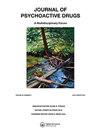Substance use Attitudes, Beliefs, Experience, and Knowledge Among Nursing and Nursing Assistant Students.
IF 2.1
4区 医学
Q2 PSYCHOLOGY, CLINICAL
引用次数: 0
Abstract
Stigma is a public health concern. Stigmatizing attitudes toward persons with substance use disorders (SUDs) can adversely impact clinical care and outcomes. Beliefs about SUD, prior experience and familiarity to persons with SUD, and educational curricula drive attitudes among health-care workers. In 2019, nursing and nursing assistant students were recruited through an online survey platform. Participants completed an SUD knowledge test and a survey assessing education, beliefs, personal experience, and confidence in recognizing the signs and symptoms of SUD. One hundred and ten health-care students (nursing students, n = 67 and nursing assistant students, n = 43) completed the survey. Among nursing assistant students, endorsing a disease model of addiction (F(2, 40) = 5.83, p < .001, R2 = .23), and personal familiarity with SUD (F(2, 40) = 4.46, p < .001, R2 = .18), were significantly positively predictive of positive regard toward working with persons with SUD. For nursing students, endorsing a disease model of addiction, educational curricula involving persons with SUD, and personal familiarity were significantly positively predictive of positive regard toward working with persons with SUDs (F(2, 61) = 11.52, p < .001, R2 = .36). Interventions to mitigate drug-related stigma among health-care students should center students with personal familiarity, promote the disease concept of addiction, and incorporate contact-based training.护理专业和护理助理专业学生对药物使用的态度、信念、经验和知识。
污名化是一个公共卫生问题。对药物使用失调症(SUD)患者的污名化态度会对临床护理和治疗效果产生不利影响。对药物滥用失调症的看法、先前的经验、对药物滥用失调症患者的熟悉程度以及教育课程都会影响医护人员的态度。2019 年,我们通过在线调查平台招募了护理和护理助理专业的学生。参与者完成了一项 SUD 知识测试和一项调查,对教育、信念、个人经历以及识别 SUD 症状和体征的信心进行了评估。110 名医护学生(护理专业学生,n = 67;护理助理专业学生,n = 43)完成了调查。在护理助理学生中,赞同成瘾疾病模型(F(2, 40) = 5.83,p < .001,R2 = .23)和个人对药物依赖性成瘾的熟悉程度(F(2, 40) = 4.46,p < .001,R2 = .18)对与药物依赖性成瘾者共事的积极态度具有显著的正向预测作用。对于护理专业的学生来说,认可成瘾疾病模型、涉及 SUD 患者的教育课程和个人熟悉程度对从事 SUD 患者工作的积极态度有显著的正向预测作用(F(2, 61) = 11.52, p < .001, R2 = .36)。为减轻医学生中与毒品有关的耻辱感,干预措施应以学生的个人熟悉程度为中心,宣传成瘾的疾病概念,并纳入以接触为基础的培训。
本文章由计算机程序翻译,如有差异,请以英文原文为准。
求助全文
约1分钟内获得全文
求助全文

 求助内容:
求助内容: 应助结果提醒方式:
应助结果提醒方式:


